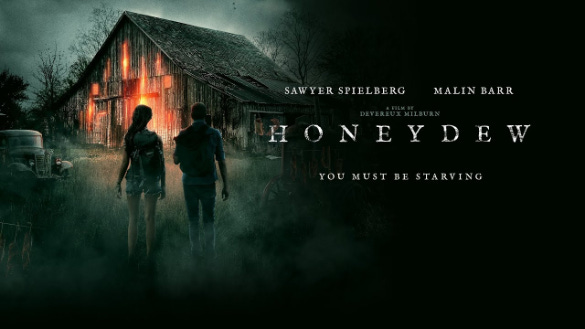Honeydew
Spielberg spawn is a cannibal's pawn in indie/art horror flick "Honeydew."
Indie/art horror flick “Honeydew” (now available on DVD and VOD) structurally echoes works such as “Hansel and Gretel” and “The Texas Chain Saw Massacre” and stylistically calls to mind “TTCSM” as well as the works of Stan Brakhage.
Young couple Sam (Sawyer Spielberg, son of Steven and actress Kate Capshaw) and Rylie (Swedish actress Malin Barr) are camping in rural New England. He’s an aspiring actor who can’t remember his lines. She’s a graduate student whose thesis about a fungal infection in wheat that caused gangrene and insanity in cows and humans drew them to the area.
Sam and Rylie are chased off their campsite by Eulis (Stephen D’Ambrose), an aged farmer who accuses them of trespassing. Unfortunately, their car battery is dead. The couple seeks refuge in the nearby home of Karen (Barbara Kingsley, real-life wife of D’Ambrose) and her brain-damaged son Gunni pronounced “Goonie” (Jamie Bradley).
Karen offers Sam and Rylie a meal and a place to stay for the night. The house is decrepit and seemingly has a TV playing old Popeye and Betty Boop cartoons in each and every room. The longer the couple stays in the home the more strange cravings and hallucinations befall them.
The actors kinda carry the day here. Spielberg has presence enough that I’d be curious to see future performances from him. Mumblecore staple Lena Dunham turns up in a humdinger of a supporting role. The standout of the bunch however is Kingsley whose manic energy and bug-eyed batshittery are the stuff nightmares are comprised of.
Written, directed and edited by Devereux Milburn from a story by Milburn and cinematographer Dan Kennedy, “Honeydew” is effectively disturbing (justifiably so with its depictions of cannibalism, autocannibalism, lobotomies and amputations) but overstays its welcome at 106 minutes. The movie would make a greater impact and be less repetitious at 90 minutes. In spite of this I was impacted by John Mehrmann’s bizarrely jangly score, Milburn’s use of Brian De Palma-inspired split screen, a cavalcade of misleading edits and the 1970s-esque title cards at the front and back of the picture.
I presume “Honeydew” is trying to say something about consumption or more specifically overconsumption, but I can’t quite put my finger on what exactly it is. It did make vegetarianism seem appealing however.



